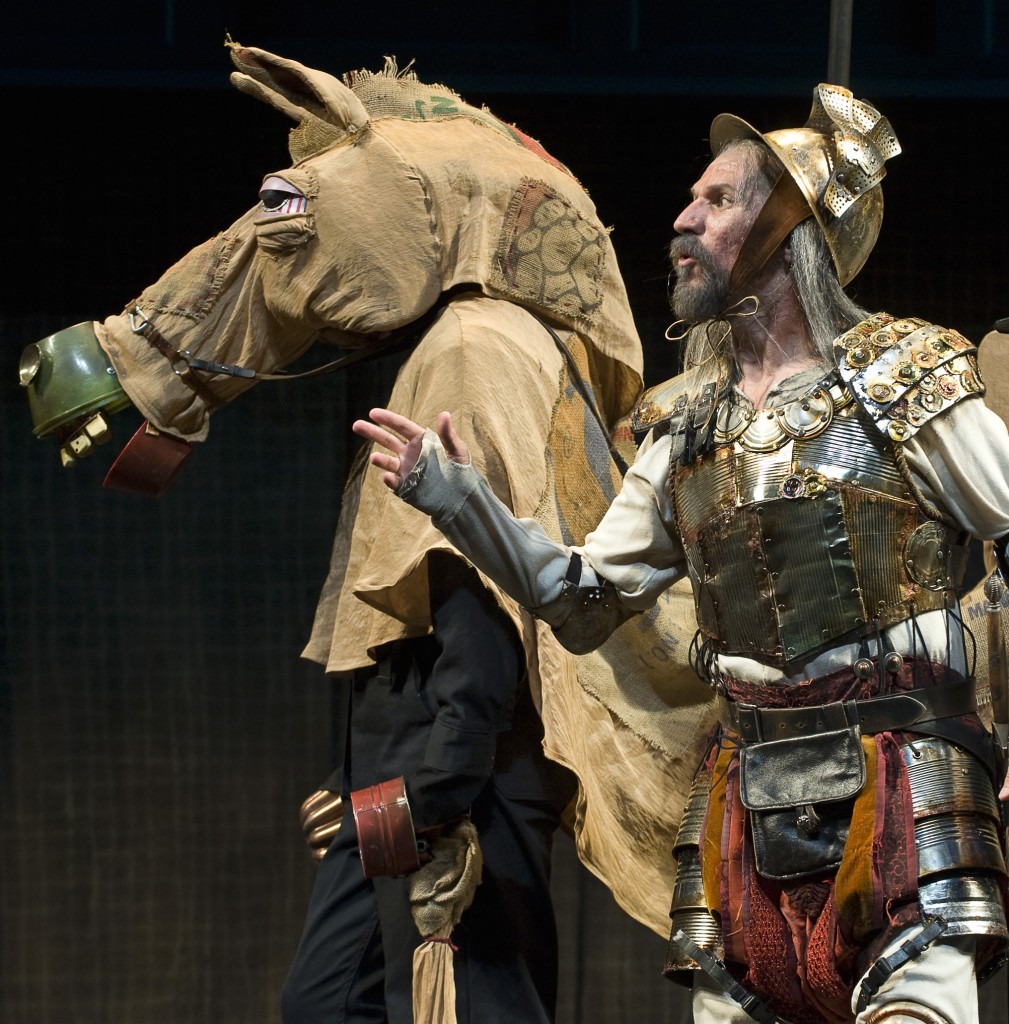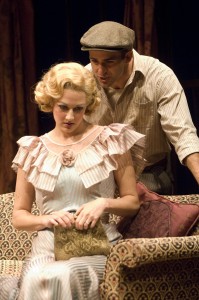
Armando Duran as Don Quixote with his noble steed Rocinante. Photo: David Cooper/Oregon Shakespeare Festival/2009
—————————————————
There aren’t many towns in America where you can spend the afternoon with Paradise Lost and then watch Don Quixote braying at the moon come night.
But this week I’m in Ashland, home of the Oregon Shakespeare Festival, and that was Tuesday’s bill of fare. No, it’s not just Shakespeare, or DeVere, or whoever wrote that great body of plays we call Shakespearean, on the festival stages.
In the case of Paradise Lost it isn’t John Milton, either. This is a latter-day variation on the theme of the Fall of Humankind — a 1935 play by the Golden Boy himself, Clifford Odets, who around this time was perhaps the most lionized young playwright in the United States, with almost concurrent productions of Waiting for Lefty and Awake and Sing! at The Group Theatre in New York. If it’s tough now to figure out exactly why Odets was such a god, well, the world and its styles have changed.
 The festival’s Don Quixote is a world-premiere adaptation by the playwright Octavio Solis, whose plays Gibraltar and El Paso Blue the company has produced in the past, and you could hardly come up with a pair of shows more different in texture: Outwardly, their personalities seem as different as the old knight-errant’s and his squire Sancho Panza’s. Paradise Lost is mostly sober-sided declamation and the anguished shredding of hair shirts. Don Quixote is mostly whimsy, pratfalls, stage tricks and elaborate horseplay (in the case of Quixote’s steed Rocinante, literally).
The festival’s Don Quixote is a world-premiere adaptation by the playwright Octavio Solis, whose plays Gibraltar and El Paso Blue the company has produced in the past, and you could hardly come up with a pair of shows more different in texture: Outwardly, their personalities seem as different as the old knight-errant’s and his squire Sancho Panza’s. Paradise Lost is mostly sober-sided declamation and the anguished shredding of hair shirts. Don Quixote is mostly whimsy, pratfalls, stage tricks and elaborate horseplay (in the case of Quixote’s steed Rocinante, literally).
But the two plays also have a curious connection, and it’s one of the things that makes a trip to Ashland so stimulating, even if you don’t much like a particular play or production. The two heroes — Don Quixote in Cervantes‘ tale, the inattentive businessman Leo Gordon in Paradise Lost — are dreamers and innocents, civilized men in uncivilized ages. And both, at least in their critics’ eyes, have been lured into foolishness by their odd attachment to reading and knowledge.
In a rude world the idealist is a failure and a fool — often a holy fool, as in the case of Dostoevsky’s Idiot and these two men. In both Don Quixote and Paradise Lost the central characters seem ineffectual at best and catastrophically detached at worst, but one suspects in both cases an even deeper authorial frustration with the modern cultures that have made these dreamers so out of touch with reality. How can Cervantes not regret a 17th century Spain in which the ideals of chivalry are nothing but a joke, or Odets the 20th century America of the Great Depression in which the cheaters and brutes prosper while the honest and earnest land on the streets? For Cervantes and Odets, humankind’s fall from grace is as much a corruption of a once nobler civilization as it is a stumbling of individual sinners on their spiritual paths. How can it be anything else when these two most graceful of men are outcasts and fools?
Continue reading Ashland 1: tilting at windmills with Clifford Odets